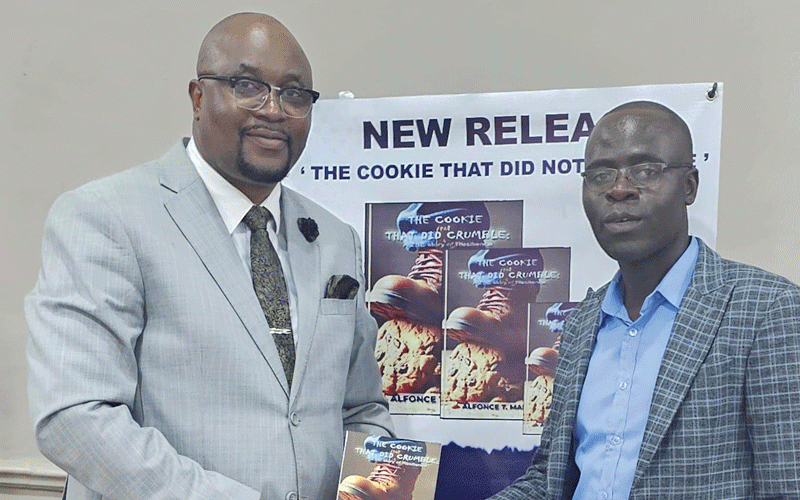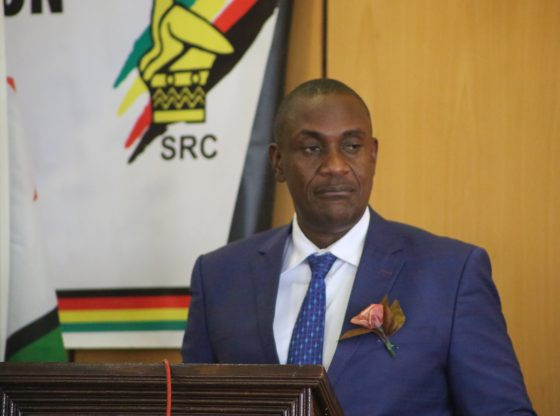
Stock market enthusiast Alfonce Maketo last week added yet another book in his investment handbook series titled The Cookie that did not Crumble: A ZSE story of Resilience at a local hotel in Harare.
Maketo’s latest offering dives into factors which militated against the operations of the Zimbabwe Stock Exchange in the past decade. He also tackles the measures that were put in place to ensure its sustainability and how the bourse managed to survive economic turbulence of the era.
The book lays out the background and challenges to Zimbabwe’s economic woes and how hyperinflation and currency instability have been a defining feature of Zimbabwe’s economy for the past two decades with severe financial consequences especially for the Zimbabwe Stock Exchange.
Guest of honour at the launch, permanent secretary for Presidential Affairs and Devolution in the Office of the President and Cabinet Tafadzwa Muguti highlighted the need for a culture shift from toxic politics to economic progress and growth.
“Zimbabwe’s economic struggles are one of the great success stories of the world, especially from how we came out of hyper inflationary era to recording economic progress in recent years”
Engineer Muguti added: “It is quite fascinating that in USA 60% of the population are aware of what happens on the stock market,in Zimbabwe only 5% are aware and participate on the Zimbabwe Stock Exchange with only 2% being literate. As a country, it is about time we embrace alternative options for investment.
Chief executive officer of the Zimbabwe Stock Exchange Justin Bgoni echoed that there was a need to teach more young people to invest on the stock market at a younger age.
“Other countries are good at retail participation especially the top of Africa, Morocco, Tunisia, Egypt are very good at it. We know that young people especially men are losing money through sports betting. What we don’t understand is why not put your money in a place where you don’t lose all of it so I think it’s a matter of education that we need to teach our young people.”
- Stop clinging to decaying state firms
- Zim bourse in limbo
- Piggy's Trading Investing Tips: De-risking mining projects
- Chance to buy 'undervalued' counters: FBC
Keep Reading
Zimbabwe’s hypeinflation crisis began in the late 1990s and peaked into the late 2000s and was triggered by a few structural misteps in policy among them the land reform programme, which was implemented in the year 2000. Though a noble move,government’s controversial land redistribution policy disrupted agricultural production ,a key sector of the economy.
The book captures how the printing of money to finance budget deficits and government spending led to a loss of confidence in the currency.
Maketo also elaborates on how the abandonment of the Zimbabwean dollar in 2009 and the official establishment of the multicurrency regime brought temporary stability and resulted in the country’s economic growth.
“In terms of economic growth,the country’s gross domestic product (GDP) grew by an average of 7% annually between 2009 and 2012”–(pp,14)
Maketo also delves into how the 2019 reintroduction of the Zimbabwean Dollar as the sole legal tender ending the multi-currency regime was met with widespread scepticism and with a slew of effects on the economy in general especially the currency depreciation which were to occur between the period 2019 and 2023.
“Firstly, there was rapid currency depreciation. The ZWL lost value rapidly. In 2019 the official exchange rate was ZWL 2.5 to USD 1 but by 2023.the parallel market rate exceeded ZWL 10 000 to US$ 1”–(pp,14)
Interestingly, Maketo juxtaposes challenges triggered by the currency instability and economic turbulence by showing the impact on the ZSE and how it responded differently.
“Expectedly, during periods of hyperinflation, the ZSE became a refugee camp for investors seeking to preserve value. Listed stocks were seen as a hedge against currency depreciation. This led to a surge in trading volumes as investors flocked to the ZSE driving up trading activity and stock prices. The year 2020 was one year in point as the ZSE rose over 1000% with some counters like CBZ growing more than 12000%”–(pp 16-17)
Maketo’s book captures ZSE challenges including delistings and how they took a heavy toll on the ZSE as its market capitalisation dropped down considerably.
He enlists key success factors which made the ZSE resilient namely diversification, innovation and government support as the ZSE expanded its listings to include sectors like technology and renewable energy as well as the adoption of digital trading platforms such as ZSE-Direct and C-Trade with the government undertaking various support measures to ensure stability in the capital markets.
Other key guest included financial experts Kudzanayi Sharara, Happy Zengeni-Manyere and Tafara Mtutu amongst others.
Born and bred in Chitungwiza, Maketo is a stock market enthusiast with a bias towards capital markets.
He holds a BSC (Hons) Degree in Agricultural Economics from the University of Zimbabwe and an MBA degree from Solusi University. He has entrepreneurial interests spanning from agricultural processing, automotive industry to mining.
Maketo, who has authored three successful volumes on Stock Market in Zimbabwe in recent years, takes pride in raising literacy on how the Zimbabwean Stock Exchange works and has conducted several workshops in enlightening the public on the importance of participating on the stock market.
n Fungayi Antony Sox is an emerging entrepreneur,brand consultant,communications and publishing specialist from Harare. For feedback email him on fungayisox@gmail.com or contact him on +263 776 030 949.










